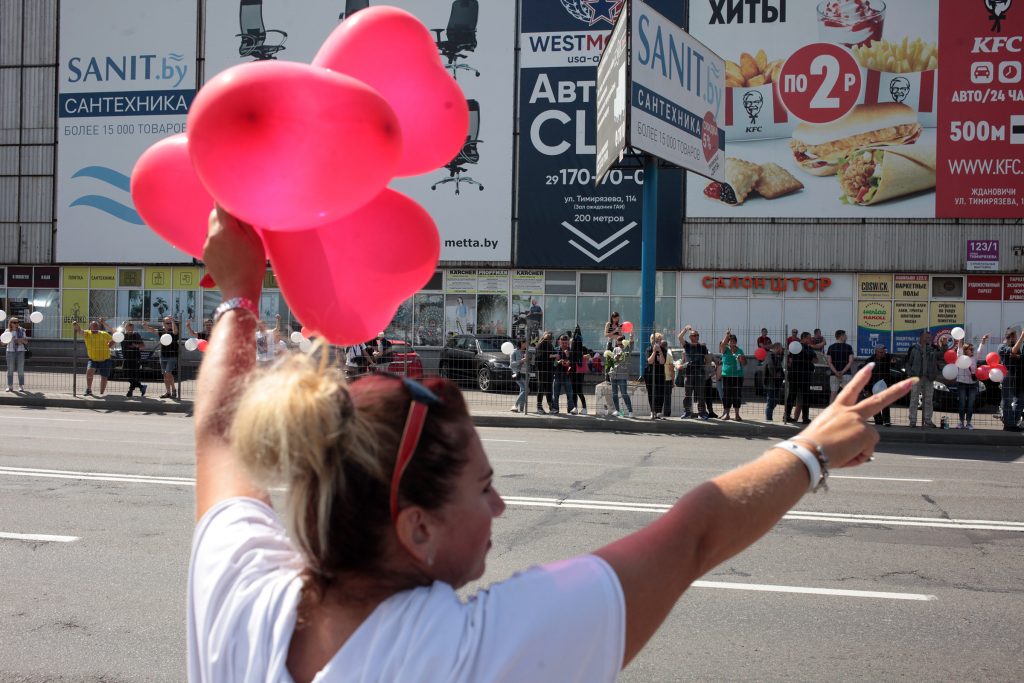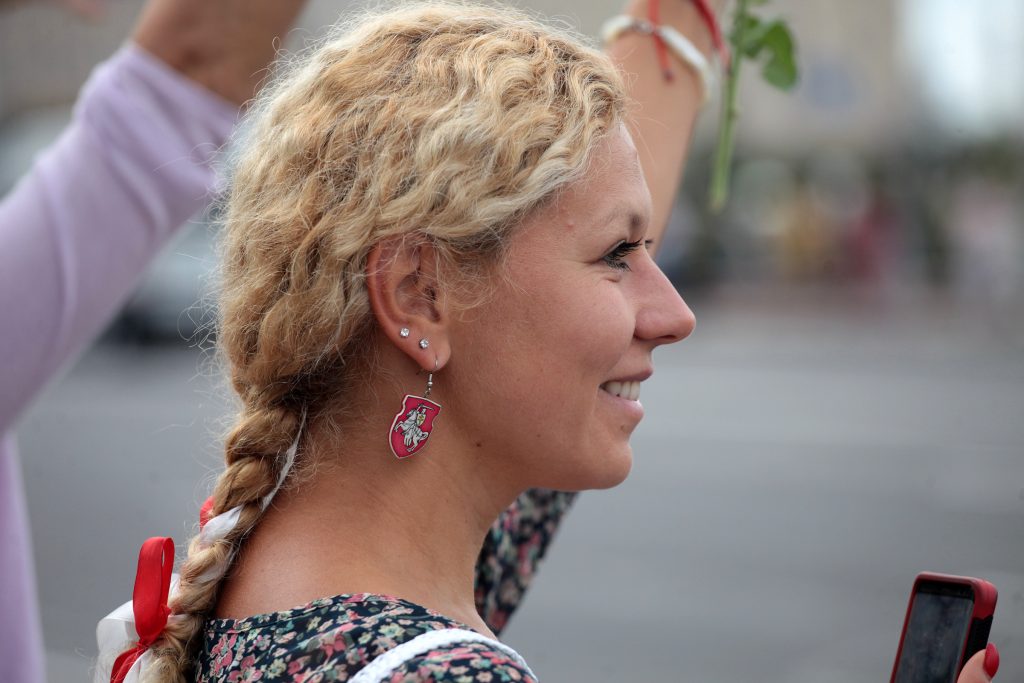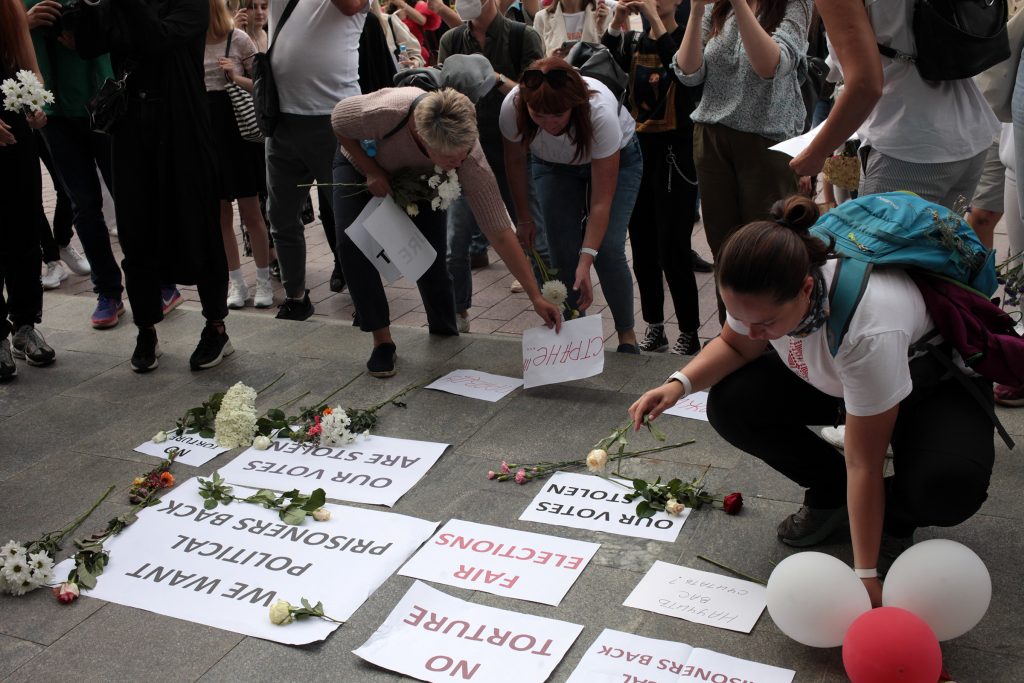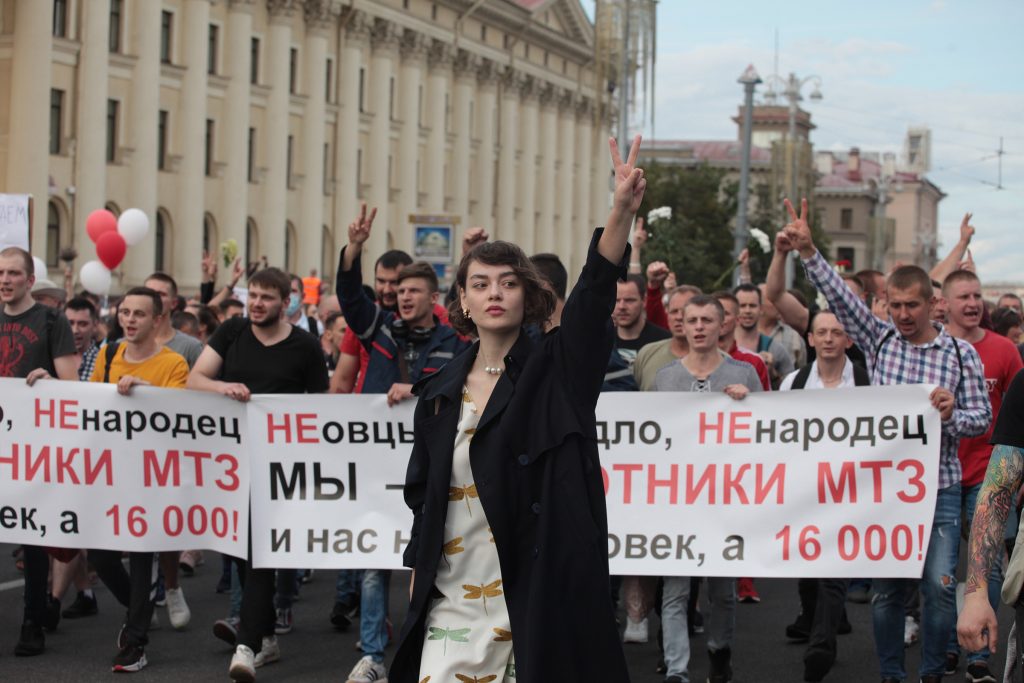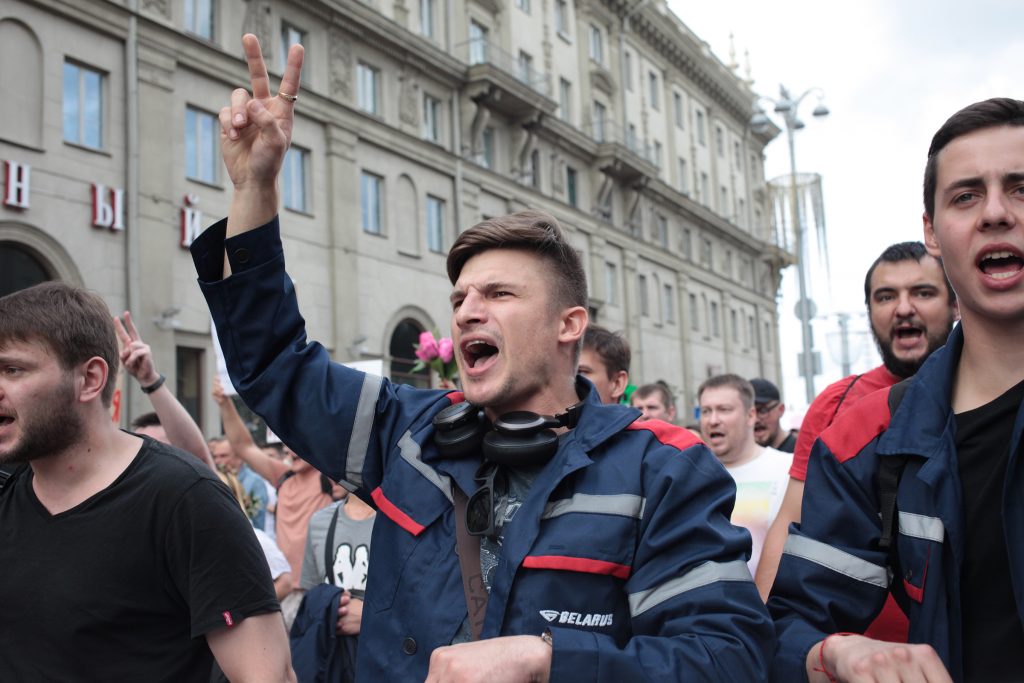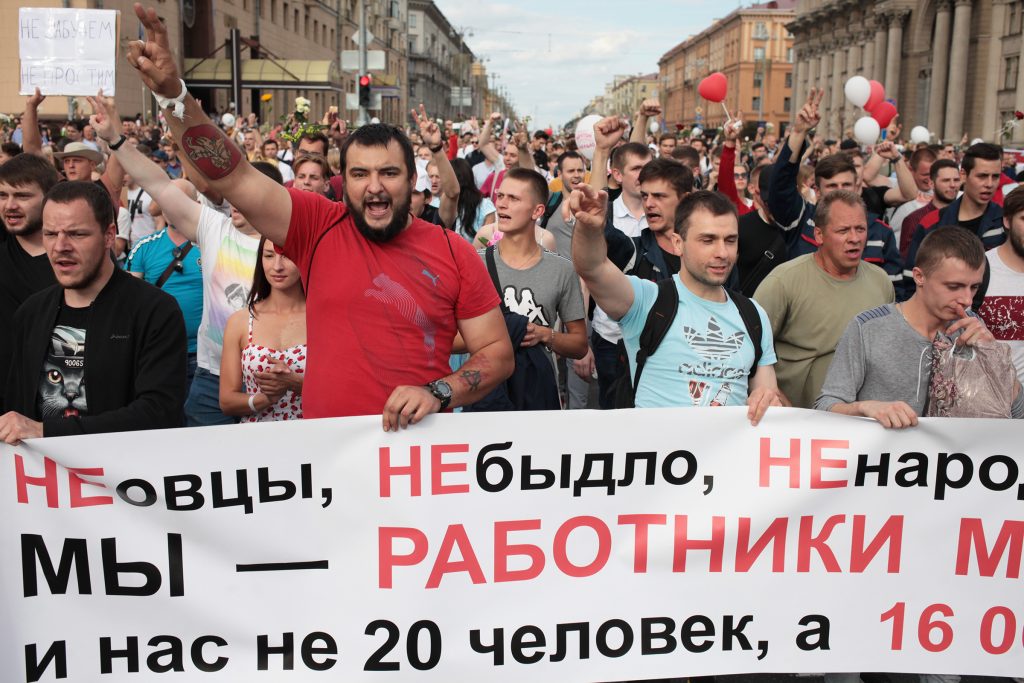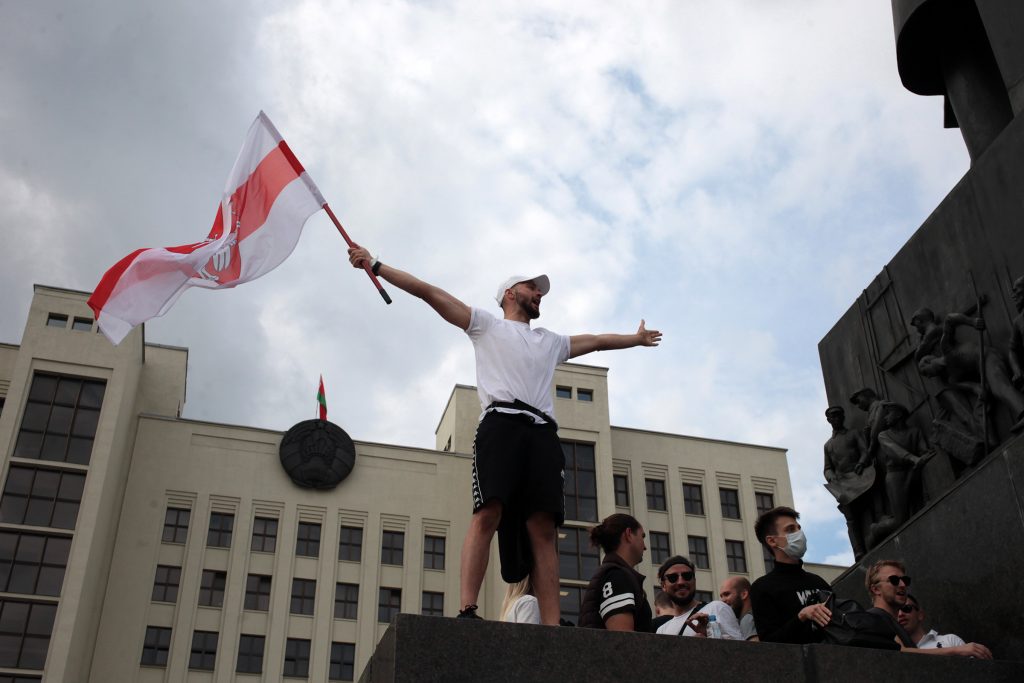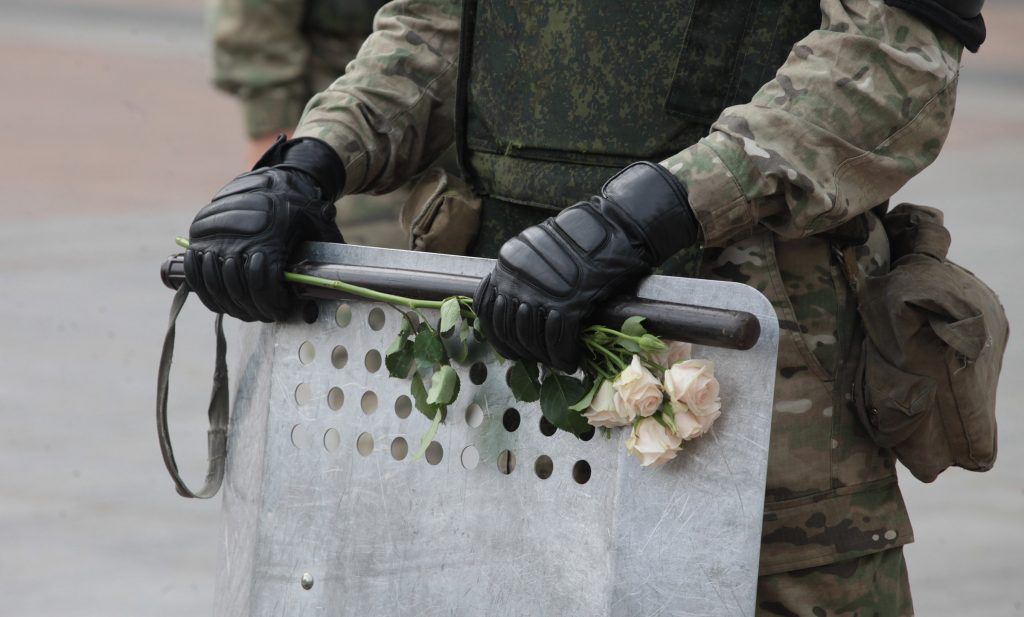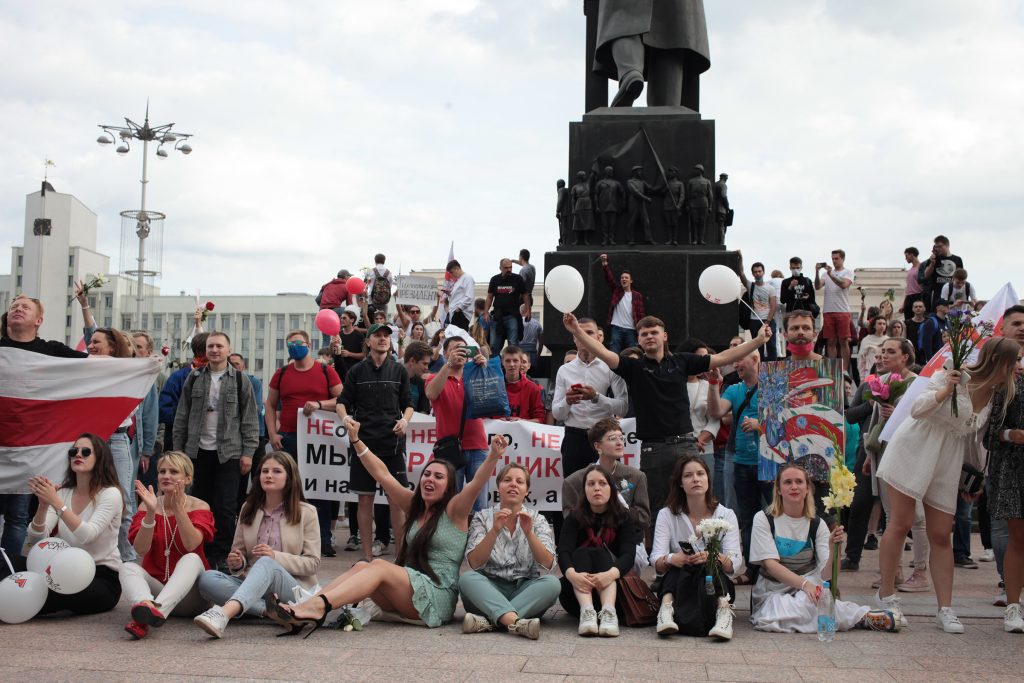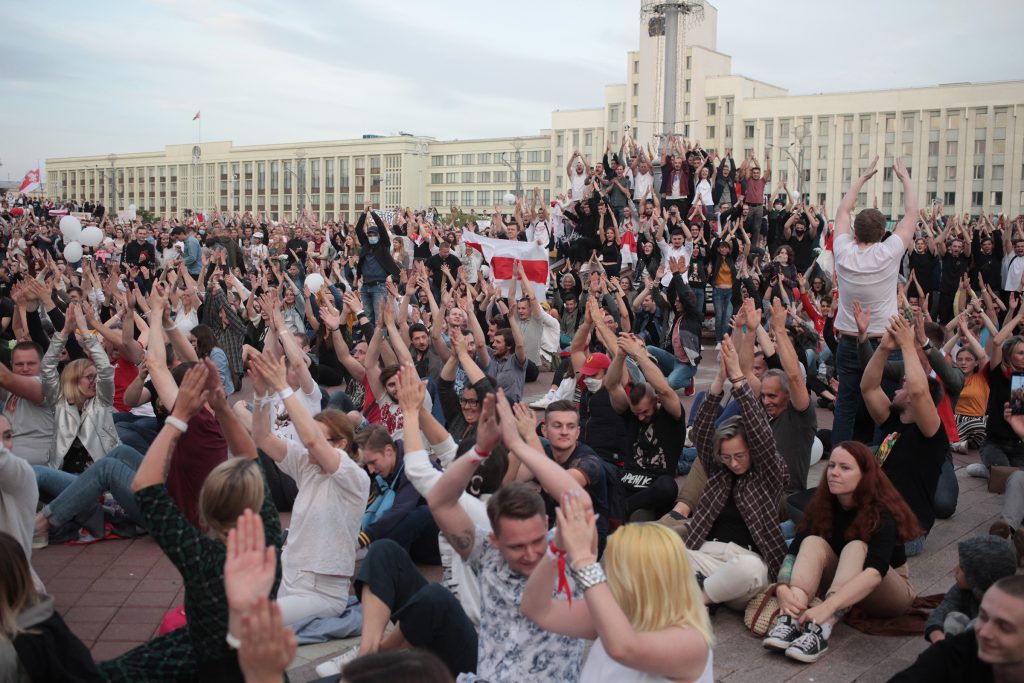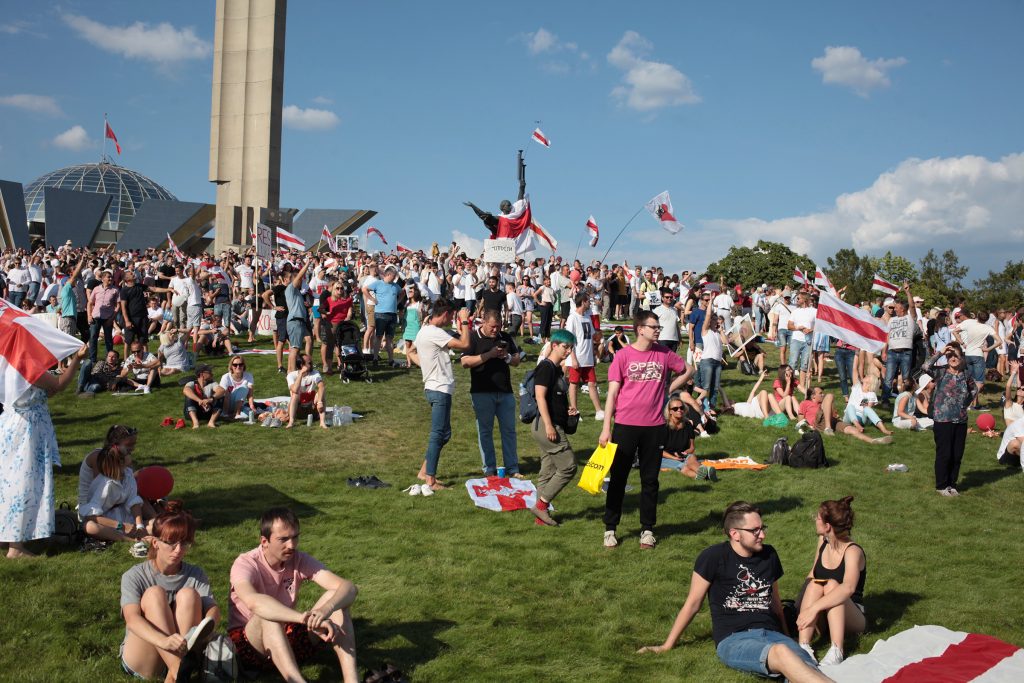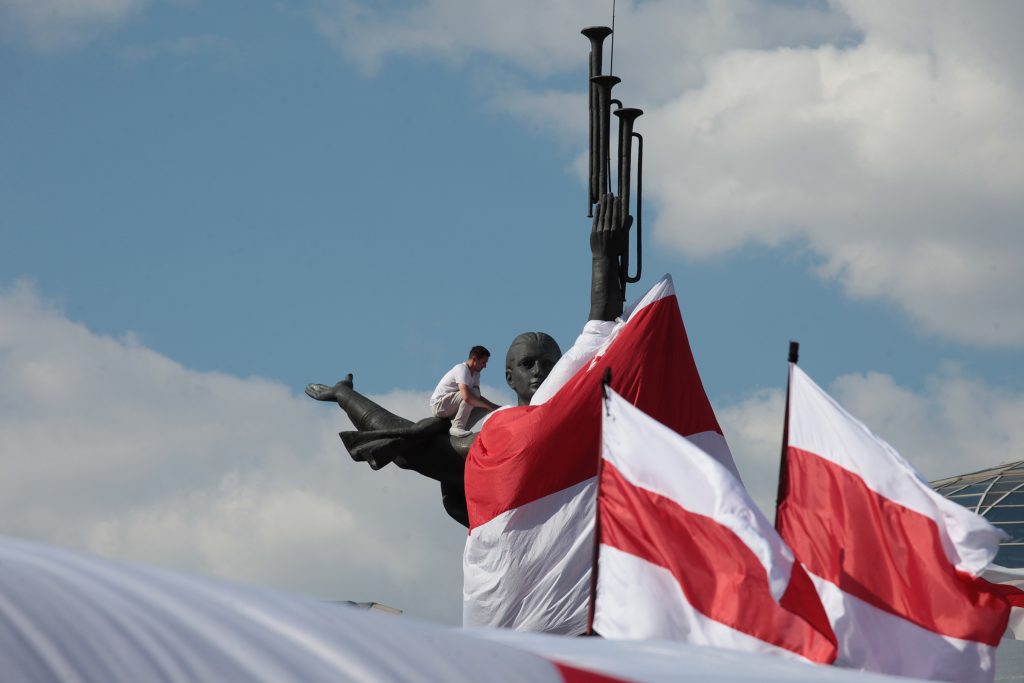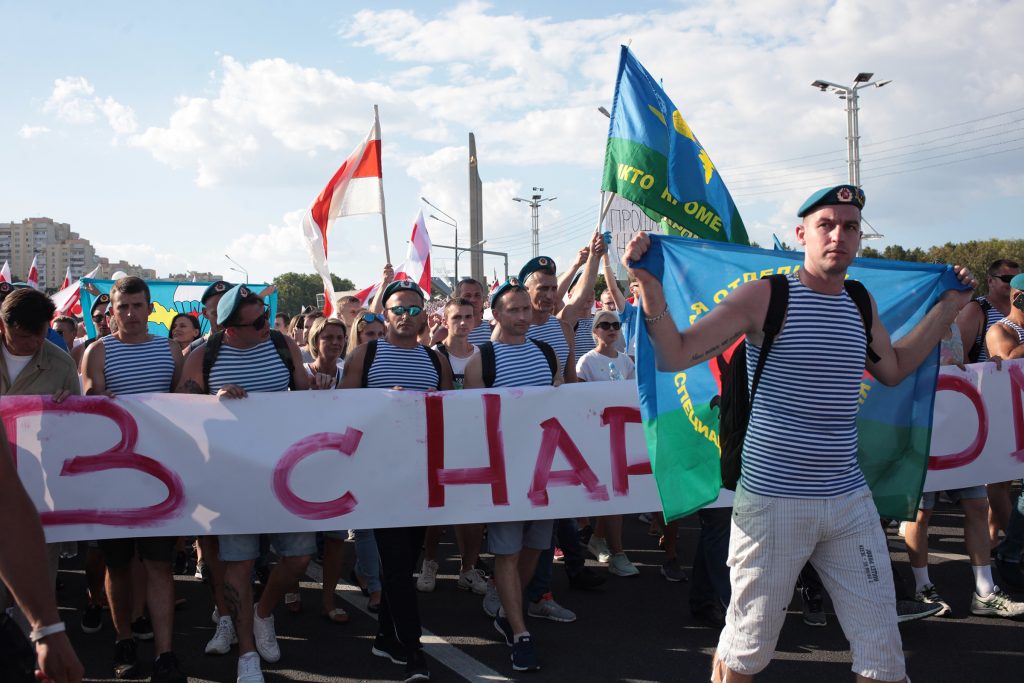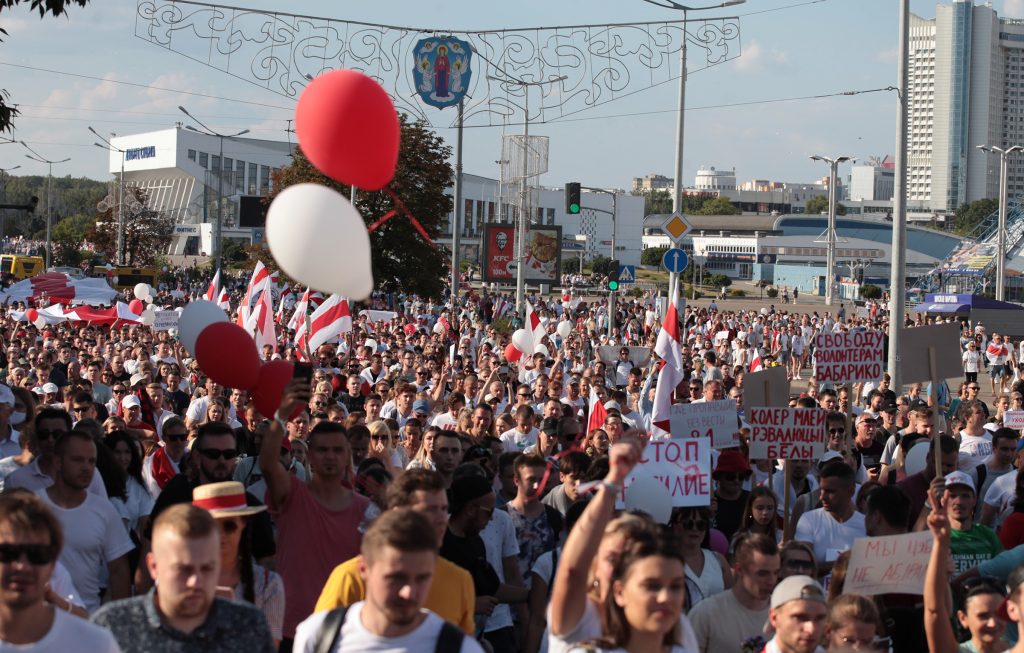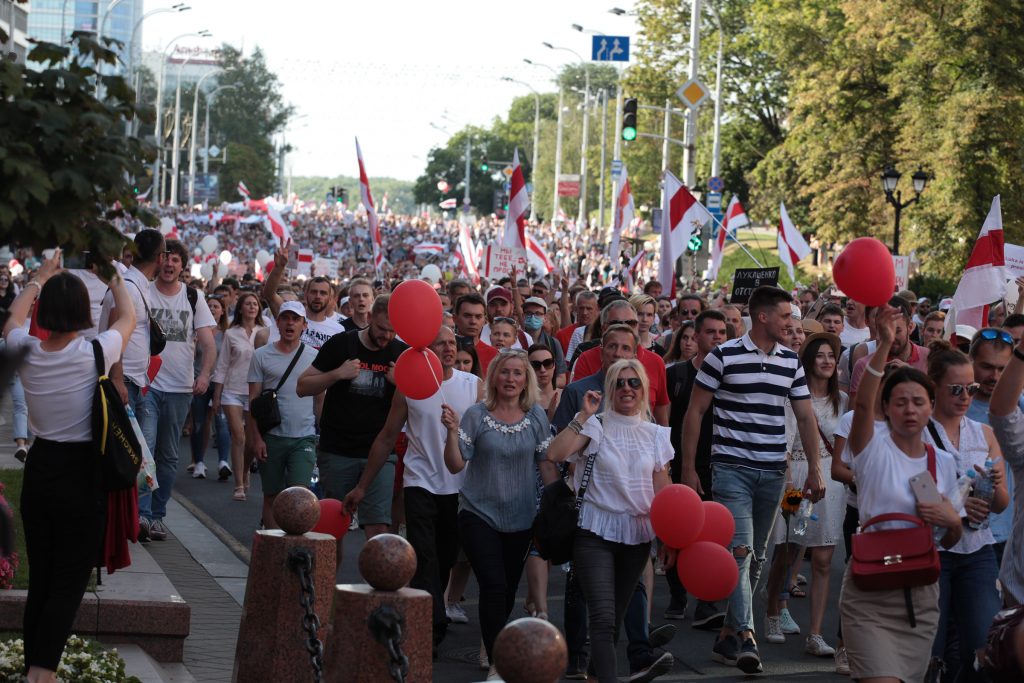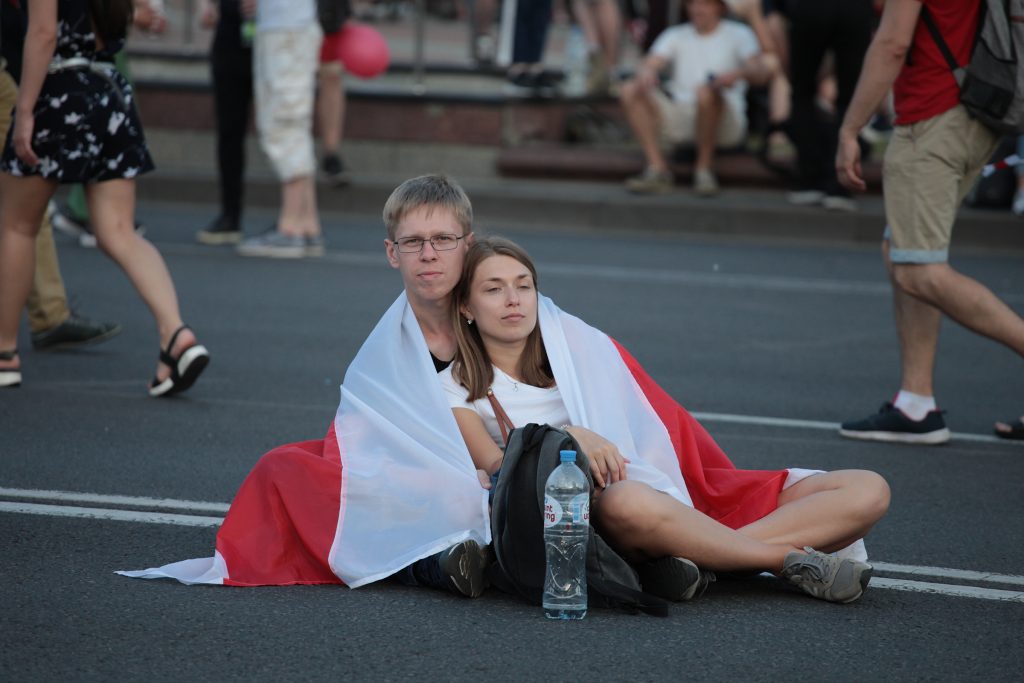Lukashenka runs to Putin amid protests
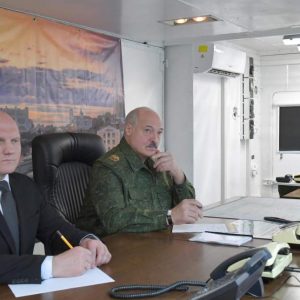
On 22 August while meeting military personnel in Hrodna Province, President Alyaksandr Lukashenka announced that his opponents had — with the aim of bringing about a “colour revolution”— been attempting to divert his attention from the domestic situation by creating tension on the Western borders. He specifically blamed NATO and ordered his troops to “defend Hrodna”.
This statement may sound odd, yet its messages clearly reflect Lukashenka’s greatest ever level of dependence on Moscow, a dependence which has developed within a mere two weeks since the election. It is little wonder, that his rhetoric in recent days has focussed on the threat from the West, with Russia hailed as Belarus’ saviour. Even to keep state TV running since an employee strike last week, Lukashenka has had to bring in journalists from Moscow. This new dependence threatens to undermine Belarusian statehood, bringing it ever closer to a situation such as that in South Ossetia or Transnistria — towards becoming a semblance of a state.
No Tiananmen Square for Belarus
The violent crackdown after the election in Belarus failed to brutally suppress the opposition, as for example the Chinese government did in Tiananmen Square in Beijing in 1989. The Chinese leadership at that time remained internationally isolated but firmly in power. On the contrary, all Minsk is now demonstrating is its own fragility and inability to cope alone. It has been forced to withdraw special police forces from the streets, tolerate unannounced demonstrations throughout the country and, ultimately, to beg Russia for help.
Lukashenka’s situation deteriorated further after 19 August, when the European Council explicitly refused to recognise the Belarusian presidential election of 9 August. This may put incumbent president Lukashenka in a precarious situation when important Western European countries, and in all likelihood the US and neighbouring states, will not accept his decisions on behalf of the country as legitimate.
This signals the end of the “multidirectional” foreign policy which his government has pursued since the mid-2000s, through careful manoeuvring between opposite poles of international politics, especially between Russia and the West. Going forward, the Belarusian government may only be able to rely on Russia and China – although Beijing is geographically far away and not willing to compete with the Kremlin over a small European country.

Military exercise on Belarusian-Polish border. Image: State Border Committee of Belarus.
Notwithstanding future EU sanctions, the recent decision of the EU leaders has already rendered Minsk extremely vulnerable and has affected the rhetoric and behaviour of the Belarusian leadership. In addition to suddenly switching to anti-Western and pro-Moscow rhetoric, it has compelled Lukashenka to militarise the crisis. On 19 August Defence Minister Viktar Khrenin ordered the troops to conduct a large-scale “comprehensive tactical” exercise around Hrodna on the border with Lithuanian and Russia, adjacent to the so-called “Suwalki Gap”.
Belarusian political scientist Andrei Kazakevich underlines that Lukashenka’s loss of international legitimacy “contradicts Russia’s plans of “deepened integration,” and may even hamper the selling of Belarusian companies to Russian businesses. However, the existence of several precarious polities on the borders of Russia proves that Moscow feels quite comfortable with unrecognised statelets, such as those in Donbas, South Ossetia, Abkhazia and Transnistria, some of which have existed for decades. Belarus is now drifting towards this type of situation. Moreover, with a better recognition status, it is still far from these pseudo-states and, hence, even more attractive an asset for Putin.
The EU to Solve the Belarusian Issue with Putin
The new situation has already led to an unprecedented flurry of direct contacts between the EU and Russia concerning developments in Belarus. No wonder that Lukashenka has refused to talk to German Federal Chancellor Merkel, which has led to her holding talks with Russian President Putin.

European Commissioner for Internal Market Thierry Breton. Image: Wikipedia
Even high-ranking European officials emphasise that in dealing with the political crisis in Belarus, they will take account of Moscow’s interests. A case in point is the interview by the European Commissioner for Internal Market Thierry Breton after an emergency conference at which the EU leaders decided to tighten sanctions on Belarus. He emphasised that negotiations with Russian leader Putin would take into account the specificity of Belarus’ relations with Russia. Breton added: “Belarus is not Europe, it is on the border of Europe, between Europe and Russia, and the situation is not comparable to Ukraine or Georgia. Belarus is really strongly connected with Russia and the majority of the population is favourable to close links with Russia.”
It is possible to imagine what kind of compromise solution the EU and Russia may hammer out for Belarus: a peaceful and nominally independent state with no major human rights issues which retains most of its existing dependencies on Russia. The minimal interest most EU countries have in Belarus may make their leaders more easily agree to the Kremlin’s role in resolving the Belarusian crisis.
How sincere is Minsk’s new policy?
There is, however, another factor which makes the sudden rapprochement with the Kremlin a shaky affair, and that is the hidden but deep distrust harboured by the Belarusian government towards current Russian leadership. Minsk knows it has to struggle for balance even now. This explains, for example, why, on 20 August, Foreign Minister Uladzimir Makey thanked the US Under State Secretary for Political Affairs, David Hale, for American support for Belarusian independence and sovereignty. The very next day, President Lukashenka again accused the US of provoking the unrest in the country.
Nevertheless, sudden changes of rhetoric and approach (like the unexpected war games accompanied by the anti-NATO unheard of for more than a decade) are scarcely an indication of sincere conviction within the Belarusian leadership. This conviction appears forced and resembles the behaviour in recent months of the mid-level Belarusian government officials with whom Belarus Daily has been in contact — avoiding articulating the issue of the Kremlin role in Belarusian politics publicly, but complaining about it privately.

Belarusian state TV on 29 July broadcast the detention of Russian so called “Wagner” mercenaries near Minsk.
Despite being well aware of the Kremlin’s hostile policies towards Belarus, nevertheless even when confronted with undeniable facts (such as the detention of Russian mercenaries with affiliations to “Putin’s Cook”, Evgeny Prigozhin) they have continued to interpret all traces of Russian influence in Belarusian politics as private initiatives by oligarchs (especially Alisher Usmanov and Oleg Deripaska) or as a crusade by Russian liberals “linked to the Democratic Party” in the US.
Although never presented publicly in a consistent and intellectually sound manner, the suspicions concerning the role of Russia even became a theme by which the Belarusian leadership motivated the security agencies for violent crack-down on the protesters. A Russian activist detained by Belarusian special police units reported how the policemen explained their actions: “There was once a great country, the Soviet Union, and because of such fagots like you, it demised. Because no one cut you down to size on time. If you [the Russian Federation] think that you have planted your Tikhanovskaya here… then you shall know that you will not succeed in making a second Ukraine here, we will not allow Belarus to become part of Russia.”
To sum up, over the last two weeks Belarus has backtracked on much of its former progress in strengthening its statehood, including developing its international neutrality and the credibility it has won over the recent decade. All of these losses have become gains for the Kremlin. If Putin further succeeds in becoming the partner of the West in solving the Belarusian issue, he can multiply his advantage.
This is the reality which all the parties in internal political confrontation must take into account, and raise in talks with foreign governments. Neither Belarusians, nor the EU, nor even Russia will benefit from Belarus becoming a new unrecognized South Ossetia. Only Putin’s corrupt government will benefit. The idea of Putin engaging to promote democracy in Belarus is a charade.
If you think that Belarus Digest should continue its work during this period critical for Belarus, please support our fundraising campaign with a donation.





